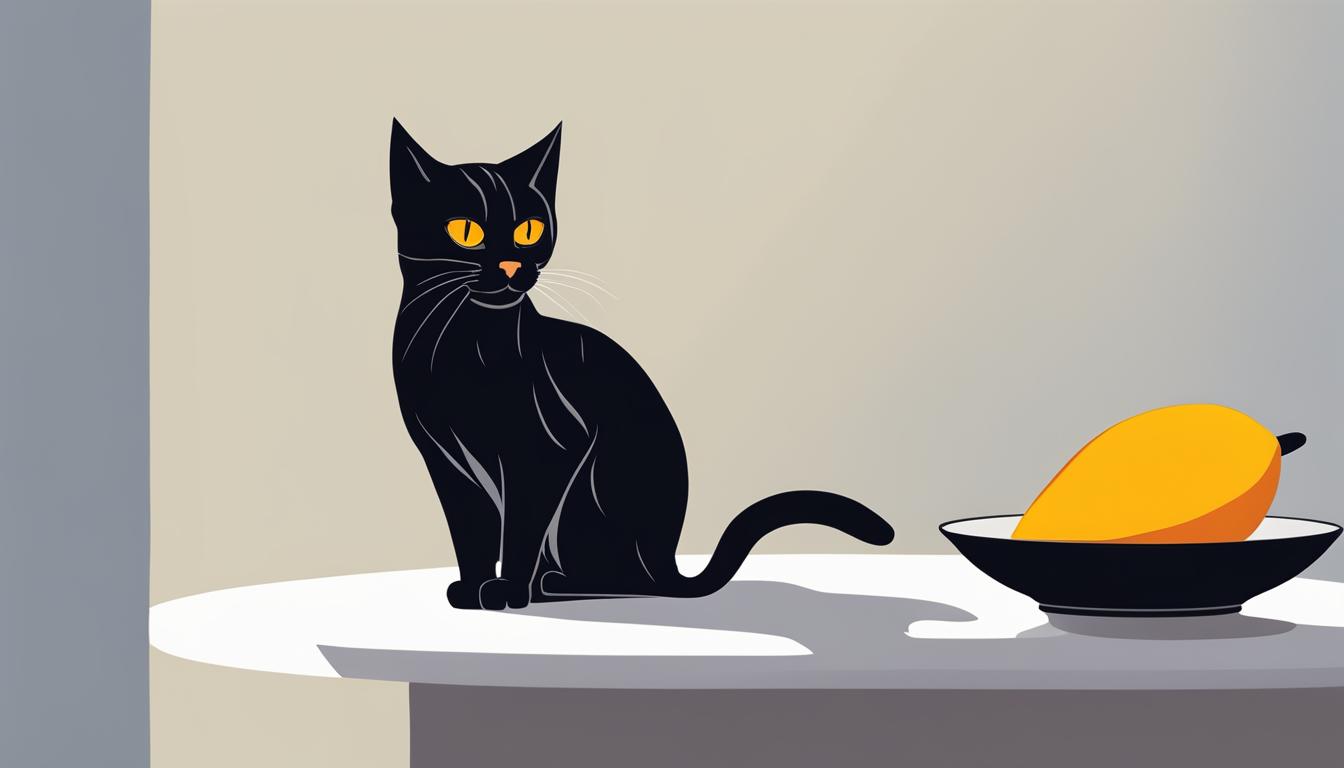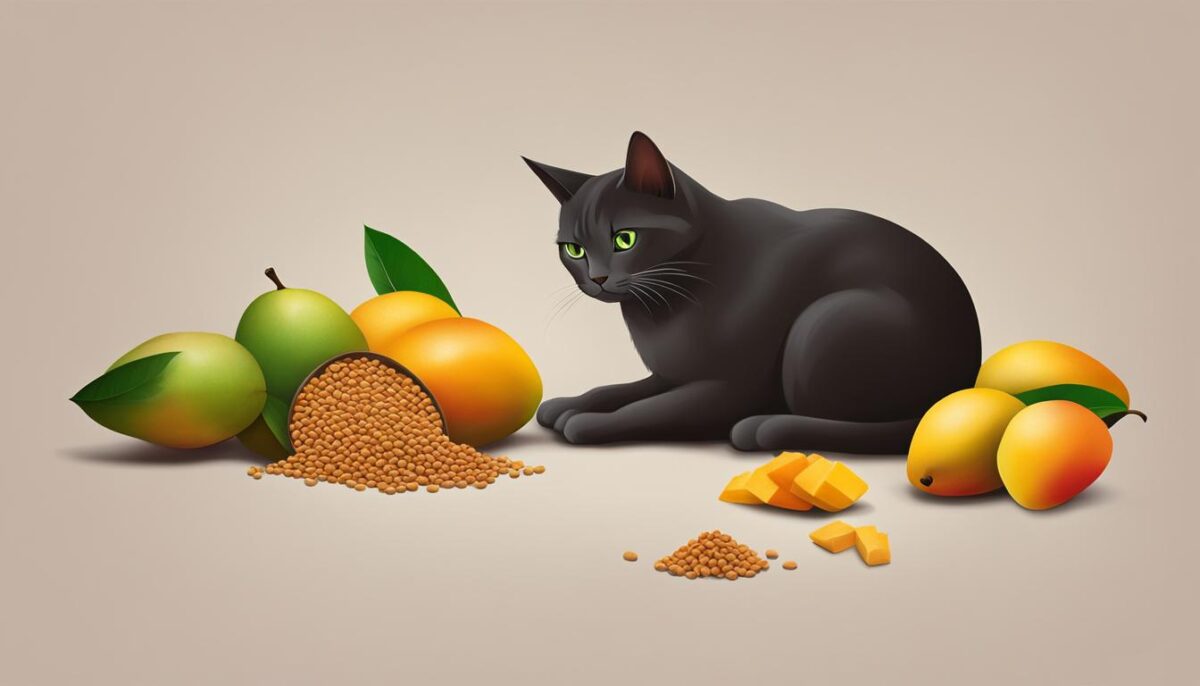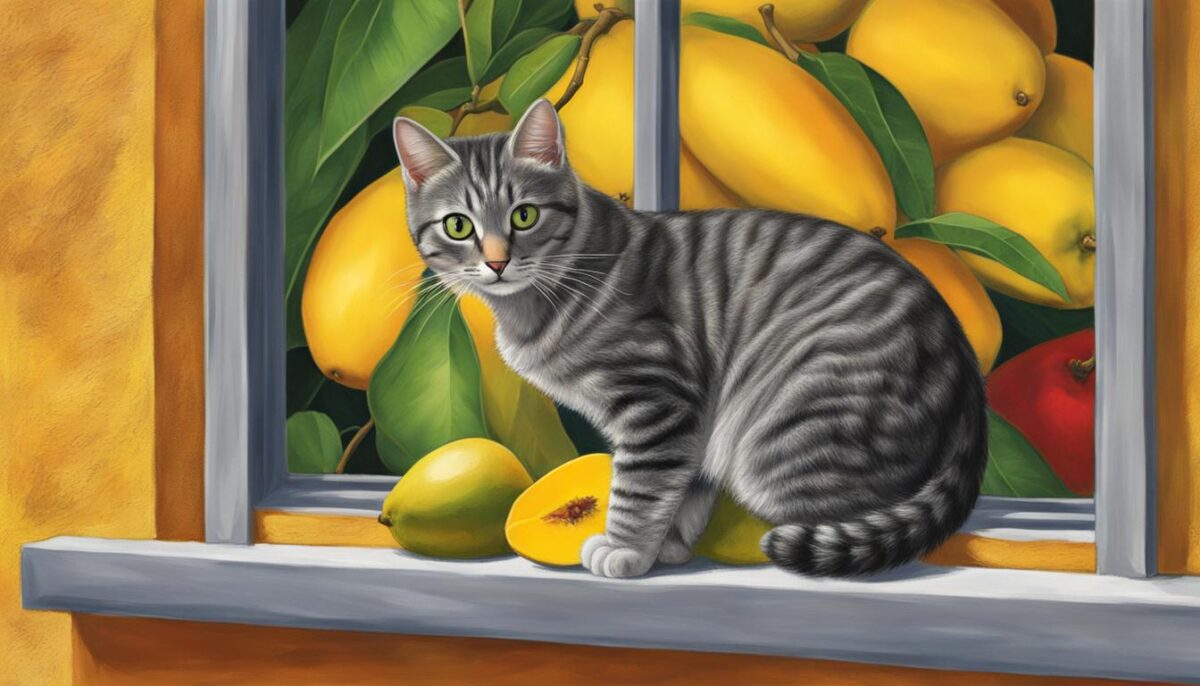Mango is a tropical fruit that many people enjoy, but what about cats? Can they safely indulge in this delicious fruit? In this article, we’ll delve into the topic and find out whether mango can be a part of a cat’s diet.
While it’s important to consider your cat’s dietary needs, it’s natural to wonder if they can have a taste of mango. Let’s explore the safety of mango for feline diets and whether it’s a suitable treat for your furry friend.
Key Takeaways:
- While mango is not toxic to cats, it should only be given in small quantities as an occasional treat.
- The high sugar content in mango can be problematic for cats with health issues like diabetes or obesity.
- Always remove the mango skin and pit, as they can pose a choking hazard to cats.
- Mango offers potential health benefits, but it should not replace a balanced cat food diet.
- Other safe fruits for cats include blueberries, watermelon (seedless), and cantaloupe.
Factors to Consider When Feeding Mango to Cats
When it comes to feeding mango to cats, there are several important factors to consider. While mango itself is generally safe for cats to consume, it should only be given to them in small quantities as an occasional treat. This is because mango contains a high sugar content, which can be problematic for cats, especially those with underlying health issues such as diabetes or obesity.
In addition to monitoring the amount of mango your cat consumes, it’s crucial to remove the skin and pit before offering it to them. The skin and pit can pose a choking hazard to cats, so it’s essential to take the necessary precautions to ensure their safety. By only providing your cat with the fleshy part of the mango, you can reduce the risk of any potential choking incidents.
It’s important to note that cats have unique dietary needs, and their primary source of nutrition should come from a balanced cat food formulated specifically for them. While mango does offer some potential health benefits, such as vitamins and fiber, it should be viewed as a supplementary treat rather than an essential part of a cat’s diet.
Potential Risks and Considerations of Feeding Mango to Cats
While mango is generally safe for cats, it’s essential to be aware of any potential risks and considerations. Some cats may have allergies or sensitivities to certain fruits, including mango. If you notice any signs of an adverse reaction, such as vomiting, diarrhea, or gastrointestinal discomfort after your cat consumes mango, it’s best to discontinue feeding it to them and consult with your veterinarian.
Additionally, the high sugar content in mango can contribute to weight gain and other issues if consumed in excess. It’s crucial to monitor your cat’s overall calorie intake and consider their individual health needs when incorporating mango or any other treats into their diet. Gradually introducing new foods and observing your cat’s response is essential to ensure their tolerance and well-being.
| Factors to Consider When Feeding Mango to Cats | Potential Risks and Considerations of Feeding Mango to Cats |
|---|---|
| Feeding mango in small quantities as an occasional treat | Some cats may have allergies or sensitivities to mango |
| High sugar content in mango can be problematic for cats with diabetes or obesity | Signs of adverse reactions may include vomiting, diarrhea, or gastrointestinal discomfort |
| Remove mango skin and pit to avoid choking hazards | Excessive mango consumption can contribute to weight gain |
By considering these factors and being mindful of your cat’s individual needs, you can make an informed decision about whether to include mango as a treat in their diet. Remember, it’s always best to consult with your veterinarian if you have any concerns or questions about what foods are safe for your cat.
Potential Benefits of Mango for Cats
While mango should be given to cats in moderation, it does offer some potential health benefits. Mango is rich in vitamins and minerals, including vitamin C, vitamin A, and fiber, which can support a cat’s immune system and digestive health. These nutrients are essential for maintaining overall well-being and can contribute to a cat’s overall vitality. Additionally, mango contains antioxidants that help combat free radicals and protect against cell damage. These antioxidants play a role in promoting healthy aging and reducing the risk of diseases.
It’s important to note that cats have unique dietary needs, and their primary source of nutrition should come from a balanced cat food specifically formulated for felines. Mango should be considered an occasional treat or supplement to their regular diet.
Benefits of Mango for Cats:
- Rich in vitamins and minerals
- Supports immune system function
- Promotes digestive health
- Contains antioxidants
While the health benefits of mango can be advantageous, it’s crucial to exercise caution when introducing any new food to your cat’s diet. Each cat may react differently to new foods, so it’s essential to monitor their response and consult with your veterinarian if you have any concerns.
Remember, moderation is key. Offering your cat small, occasional pieces of mango can add variety to their diet and provide a tasty treat. However, it’s essential to prioritize their nutritional needs with a balanced, complete cat food that meets all their dietary requirements.
Potential Risks and Considerations of Feeding Mango to Cats
While mango is generally safe for cats to consume, there are some potential risks and considerations to keep in mind. It’s important to be aware of these factors in order to ensure the well-being of your feline friend.
Allergies and Sensitivities
Just like humans, cats can have allergies or sensitivities to certain foods, including mango. While mango allergies in cats are rare, it’s possible that your cat may have an adverse reaction if they are sensitive to this tropical fruit. Keep an eye out for signs such as vomiting, diarrhea, or gastrointestinal discomfort after your cat consumes mango. If you suspect an allergy or sensitivity, it’s best to consult with your veterinarian.
Sugar Content
Mango is naturally sweet and contains a high amount of sugar. While a small amount of mango as an occasional treat is unlikely to cause any harm, excessive consumption of sugary fruits like mango can contribute to weight gain and other health issues in cats. It’s important to remember that cats have specific dietary needs, and a balanced cat food formulated for their nutritional requirements should always be the main component of their diet.
Gradual Introduction and Monitoring
When introducing mango or any new food to your cat’s diet, it’s crucial to do so gradually. Start by offering a small amount and closely observe your cat’s response. If they tolerate it well and show no signs of discomfort, you can continue to offer mango as an occasional treat. However, if your cat shows any negative reactions or gastrointestinal issues, it’s best to discontinue feeding them mango and consult with your veterinarian.
While mango can be an enticing and tasty treat for cats, it should be given in moderation and with caution. Always prioritize your cat’s individual health needs and consult with your veterinarian if you have any concerns about incorporating mango or any other new food into their diet.
Alternatives to Mango for Cats
If you’re looking for alternative fruits that are safe for cats to enjoy, there are several options. Providing your cat with a variety of cat-safe fruits can add some excitement to their diet and offer nutritional benefits. Here are a few fruits that you can consider:
- Blueberries: These small berries are packed with antioxidants and can be a healthy and tasty treat for your cat. They are low in calories and contain vitamins and minerals that can support your cat’s overall well-being.
- Watermelon (seedless): Watermelon is a hydrating fruit that can be refreshing for your cat on a hot day. Just make sure to remove the seeds before feeding it to your furry friend.
- Cantaloupe: This sweet melon is another safe option for cats. It is rich in vitamins A and C, as well as fiber, which can aid digestion.
When feeding these fruits to your cat, it’s important to remember that moderation is key. Fruits should only make up a small portion of your cat’s diet and should be given as an occasional treat. Also, make sure to wash the fruits thoroughly before serving them to your cat to remove any pesticides or dirt.
While these fruits are safe for cats, always monitor your cat’s reaction and consult with your veterinarian if you have any concerns about adding new foods to their diet. Your veterinarian can provide guidance on portion sizes and help you determine the best approach to incorporate fruits into your cat’s overall nutrition plan.
Conclusion
In conclusion, mango can be a tasty and safe occasional treat for your cat. However, it is important to keep in mind your cat’s individual health needs and any potential allergies or sensitivities they may have. While mango is not toxic to cats, it should never replace their balanced cat food diet, which is specially formulated to meet their nutritional needs.
When introducing mango or any new food to your cat’s diet, it is best to do so gradually and in small quantities. Pay close attention to their response and monitor for any signs of adverse reactions such as vomiting, diarrhea, or discomfort.
If you have any concerns or questions about your cat’s diet, it is always advisable to consult with your veterinarian. They can provide personalized guidance based on your cat’s specific needs and help ensure they maintain a healthy and balanced feline diet.
FAQ
Can cats eat mango?
Yes, cats can eat mango, but it should only be fed to them in small quantities as an occasional treat.
Is mango toxic to cats?
Mango itself is not toxic to cats, but it’s important to remove the skin and pit, as they can pose a choking hazard.
Are there any health benefits of feeding mango to cats?
Mango is rich in vitamins and minerals, including vitamin C, vitamin A, and fiber, which can support a cat’s immune system and digestive health.
Are there any risks of feeding mango to cats?
Cats with underlying health issues like diabetes or obesity may have trouble metabolizing the high sugar content in mango. Some cats may also have allergies or sensitivities to mango.
What are some alternative fruits that are safe for cats to eat?
Blueberries, watermelon (seedless), and cantaloupe are safe choices that can provide cats with a sweet and refreshing treat.
Should mango replace a balanced cat food diet?
No, mango should only be given as an occasional treat and should never replace a balanced cat food diet.


